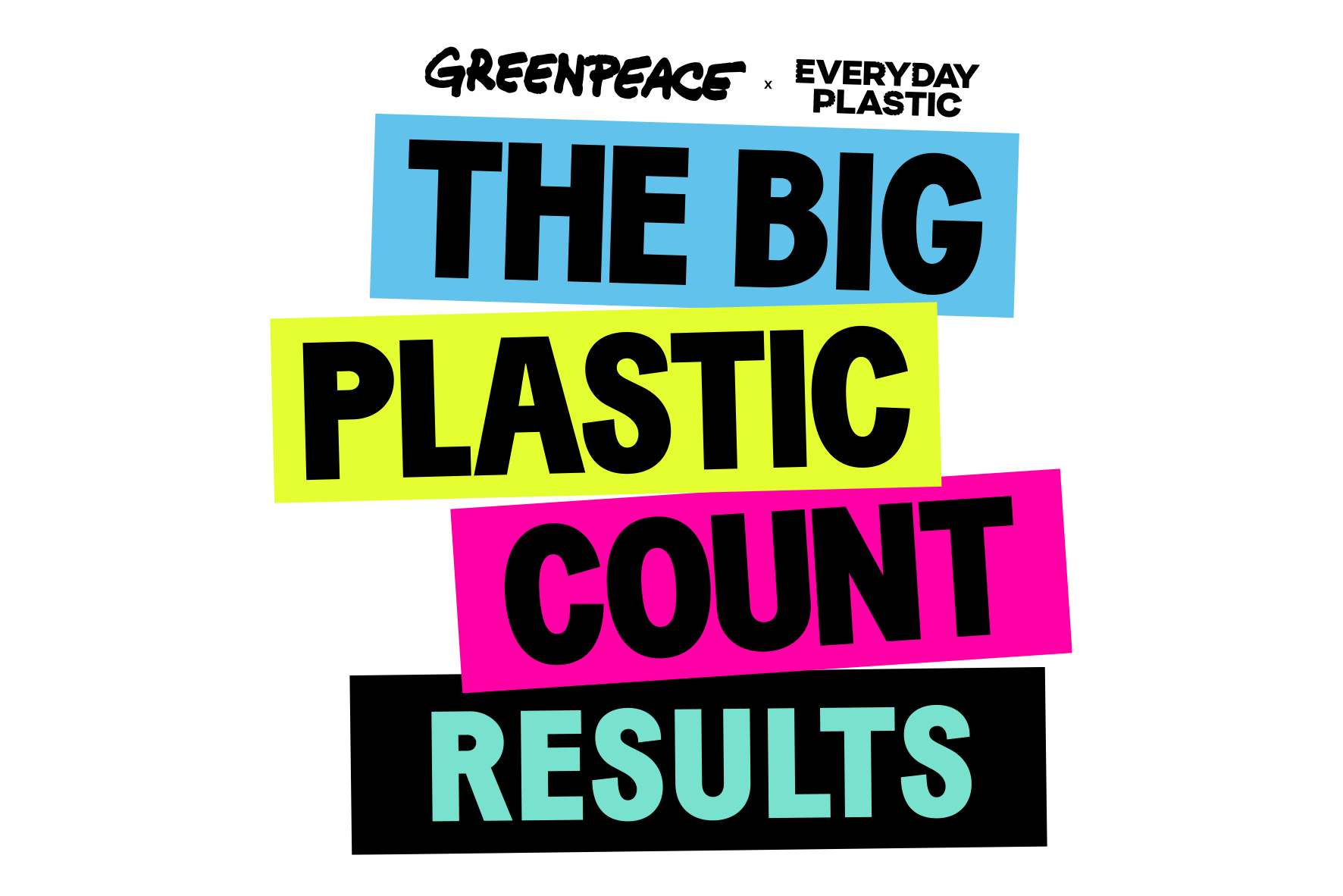The Big Plastic Count, conducted by Greenpeace UK and Everyday Plastic, with academic support from the Revolution Plastics Institute at the University of Portsmouth, found that UK households discard an estimated 90 billion plastic pieces annually, with only 17% being recycled domestically.
Running from 11-17 March this year, The Big Plastic Count saw participation from nearly 225,000 individuals, from over 77,000 households, and numerous members from community groups and businesses across the UK. This figure included 28,000 pupils from over 5,000 school classes, demonstrating the desire for change amongst young people. Counts were submitted across all 650 parliamentary constituencies, and 50 MPs across all parties, including ministers and shadow ministers, also took part.
Further results from The Big Plastic Count 2024 revealed:
- UK households throw away an estimated 1.7 billion pieces of plastic weekly (60 pieces per household per week), equivalent to 90 billion a year. 1.7 billion pieces of plastic would take one person 53 years and 7 months to count at one second per piece.
- Snack packaging (699,932 pieces) and fruit and veg packaging (697,085 pieces) emerged as the most commonly counted plastic items.
- Over half (58%) of the pieces of plastic packaging thrown away are being incinerated – up 12% from 46% in 2022.
- 17% was recycled in the UK, followed by waste exports (14%) and landfill (11%).


It’s clear from these results that the plastic waste problem is not getting any better, and that recycling is not going to solve it. New thinking around packaging choices, backed up by legislation, is urgently needed. Implementation of reuse and refill systems for instance could transform the plastics economy from a linear to a more circular model and significantly reduce plastic production and plastic pollution. The negotiations for the Global Treaty to End Plastic Pollution in Canada next week present a critical opportunity to galvanise change. The Revolution Plastics Institute will be attending negotiations, and will be sharing these important results with policy and decision makers.
Dr Cressida Bowyer, Deputy Director of the Revolution Plastics Institute
The national survey shows waves of plastic packaging leave homes across the UK each week. A recent Greenpeace International report showed that 74% of the UK public supports cutting plastic production to curb pollution, underscoring the need for the government to take decisive action to reduce plastic production and transition towards sustainable alternatives.
Dr Cressida Bowyer, Deputy Director of the Revolution Plastics Institute at the University of Portsmouth, said: “It’s clear from these results that the plastic waste problem is not getting any better, and that recycling is not going to solve it. New thinking around packaging choices, backed up by legislation, is urgently needed. Implementation of reuse and refill systems for instance could transform the plastics economy from a linear to a more circular model and significantly reduce plastic production and plastic pollution. The negotiations for the Global Treaty to End Plastic Pollution in Canada next week present a critical opportunity to galvanise change. The Revolution Plastics Institute will be attending negotiations, and will be sharing these important results with policy and decision makers.”
The incineration issue
The ramifications of our plastic consumption extend beyond environmental concerns. Incinerating plastic not only exacerbates climate change and can release more carbon dioxide per tonne than burning coal, but it is also incompatible with the government’s commitment to drastically reduce greenhouse gas emissions by 2050 and poses health risks to local communities, often in economically disadvantaged areas. With 57 incinerators in operation across the UK, and 18 new incinerators in construction, urgent measures are necessary to address this escalating crisis.
Plastic production is out of control
An estimated 1.7 billion pieces are being thrown away a week in the UK, demonstrating that plastic production is showing no signs of slowing down. The Big Plastic Count shows what being the world’s second biggest producer of plastic waste looks like – the UK throws away more plastic per person than every other country in the world, except the US.
Recycling will never be able to catch up with the volume of plastics being produced. Instead, there’s a pressing need for supermarkets and policymakers to embrace reuse and refill schemes that meet the UK public’s desire for sustainable choices.

Inadequate action on plastic from supermarkets
With 81% of plastic counted consisting of food and drink packaging, likely coming from supermarkets, Greenpeace and Everyday Plastic are urging supermarkets to do more to reduce unnecessary plastic packaging.
As part of the UK Plastics Pact, supermarkets promised to make all their packaging reusable, recyclable or compostable by 2025, focusing on ‘supercharging recycling’. These results show that they are miles off reaching that goal – despite it being unambitious in the first place. Recycling alone won’t fix the problem. Supermarkets must match the ambition of the UK public, who are overwhelmingly in favour of reuse, refill and reduction schemes that transform how we shop, as new Greenpeace International polling shows.
The Global Plastics Treaty
The Big Plastic Count 2024 comes ahead of the fourth Intergovernmental Negotiating Committee (INC4) meeting for a Global Plastics Treaty, which will be held in Ottawa, Canada, this month. Recent polling from Greenpeace International, found that 74% of UK residents agree that to stop plastic pollution, we need to cut plastic production. The polling found that 69% of UK residents support the Global Plastics Treaty agreeing a reduction in plastic production, in order to stop biodiversity loss and limit global warming to 1.5 degrees Celsius.
Call to Action to the UK Government
In response to the alarming figures from The Big Plastic Count, Greenpeace UK and Everyday Plastic issue a call to action for the government to:
- Show leadership at the Global Plastics Treaty negotiations by calling for a legally binding global target to cut plastic production by at least 75% by 2040
- Speed up the introduction of innovative reuse and refill models.
- Completely ban all plastic waste exports by 2027 at the latest.
- Immediately implement an all-in Deposit Return Scheme (DRS) and Extended Producer Responsibility (EPR) requirements for recycling and reuse.
- End approvals for new incineration facilities.

Supporting Quotes
“We’re using everyone’s evidence from The Big Plastic Count to confront ministers with the scale of the plastic waste problem and to show the extent of the public’s concern and demand for solutions. The plastics crisis is out of control, with production set to triple by 2050 if the industry has its way. The worst affected are the marginalised communities and People of Colour who are more likely to live near incineration sites or to be harmed by the waste we dump in countries in the Global South. This year, we have a once-in-a-generation opportunity to finally secure a global, legally binding target to radically reduce plastic production, but it will only deliver the kind of progressive action needed if countries like the UK push for plastic production to be reduced by at least 75% by 2040.” Rudy Schulkind, Political Campaigner at Greenpeace UK
“If I started counting every bit of plastic packaging the UK throws away in a week, it would take me until 2077 to count every piece. The problem is huge, and the challenge of fixing it can feel overwhelming. There are solutions out there though. We just need our politicians and big businesses to grasp them – whether that’s moving to refill and reuse products that are accessible to all or introducing targets to cut plastic production.” Laura Burley, Project Lead for The Big Plastic Count at Greenpeace UK
“Over 224,000 people from across the country took part in The Big Plastic Count this year. Our participants have helped us to expose the plastic waste crisis through this unique and engaging investigation, and we’ve revealed that more plastic waste is being burned than ever. Over half of the counted plastic packaging (58%) is ending up at an incinerator, a significant increase on the last Count in 2022. It’s time that the government and supermarkets take urgent action to stop endless plastic production.” Daniel Webb, Founder and Director, Everyday Plastic
“I took part in The Big Plastic Count, and I felt shocked by the results I received. I want to be part of a real solution because, although I believe we should all feel a sense of responsibility for our planet and its future, I’d like the government to make bigger changes and act more quickly, for the future generations like my son, and the wildlife, as there’s so much plastic everywhere and it’s so harmful.” Chloë Scrivener, Dorset, participant of The Big Plastic Count
“Understanding where our waste comes from and holding its producers to account is such an important step towards tackling our collective plastic waste consumption. Seeing the impact that The Big Plastic Count has had over the last couple of years, and the young people it has inspired and engaged along the way, has been brilliant.” Amy Meek, Co-founder & CEO, Kids Against Plastic

